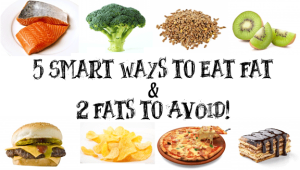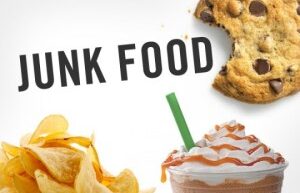If you read Coach Kozak’s recent article, 7 Nutrition Lies that Led to an Obesity Epidemic, then you know that one of the most popular lies is that fat makes you fat. The truth is your body needs the monounsaturated and polyunsaturated fats, known as the “good fats” as they can help in lowering your risk for certain diseases.
For optimum health, you’ll want to choose foods that contain the good fats such as Omega-3 fatty acids and avoid trans fats and the saturated fats found in red meats, processed foods, creams and butters. So what are good fats?
5 Smart Ways to Eat Fat
1. Oils
Choose from oils such as olive, sesame, avocado, walnut, canola and flax seed oils. These contain Monounsaturated Fatty Acids (MUFA) and are liquid at room temperature. Steer clear from any anything that contains hydrogenated oils, the oil most often used in fast food and restaurant fried foods. Try this Avacodo Dip.
2. Nuts and Seeds
Almonds, raw sunflower, cashews, pumpkin seeds, flax seeds and walnuts are all great examples of nuts and seeds that are chalked full of healthy fats that are good for your heart. They’re great for a snack in place of the processed cookie you’ve been staring at in that vending machine. Try these Cashew Protein Balls.
3. Omega-3 Rich Foods
Choose eggs, milk, cheese and meat from grass-fed beef, which contain more omega-3s than conventional varieties.
4. Fish
Fatty fish like salmon, mackerel, herring, lake trout, sardines and albacore tuna are high in omega-3 fatty acids. Omega-3 and omega-6 fatty acids are types of Polyunsaturated Fatty Acids (PUFA) and are considered essential fatty acids because our bodies cannot make them, thus they must be obtained through the diet. Try these Quinoa Salmon Patties.
5. Coconut Oil
All saturated fats are not created equal. Saturated fats found in this oil are naturally occurring, while other fats are artificially manipulated through the man-made process called hydrogenation. It contains Medium Chain Fatty Acids that have been shown to stimulate weight loss as well as your metabolism. Try these Oatmeal Chocolate Chip Cookies (made with coconut oil).
2 Fats to Avoid
1. Trans Fatty Acids
Trans fats are liquid vegetable oils that have been chemically processed to become semisolid at room temperature through the addition of hydrogen atoms. Also called “partially hydrogenated” oils, they are used in some margarines, fried foods, and process snack foods to improve the flavor, texture and increase shelf-life. Check food labels for trans fats. Avoiding commercially-baked goods goes a long way. Also limit fast food.
2. Processed Meats
Stay away from processed meats such as deli meats, bacon, and sausages as they’re usually high in saturated fats. Try replacing red meat with beans, nuts, poultry, and fish whenever possible, and switching from whole milk and other full-fat dairy foods to lower fat versions or choose nut milks such as almond or hemp.
In short, if you are concerned about your weight or heart health, rather than avoiding fat in your diet, try replacing trans fats and some saturated fats with good fats. This might mean replacing fried chicken with fresh fish, swapping some of the meat you eat with beans and legumes, or using olive oil rather than butter.
BONUS: The Problem with Non-Fat and Low Fat Diets
Low fat and fat free diets are not healthy because they prompt people to eradicate fats from their diet altogether. This includes fats that are good for your heart as well. When food manufacturers take out the fat in the food you eat, they replace it with refined carbohydrates, sugars, and starches. This can cause unsafe spikes in your blood sugar and insulin levels that often times lead to hunger, overeating, and ultimately weight gain. Overtime, the consumption of fast acting carbs can increase your risk of diabetes and heart disease, the complete opposite of what most people try to achieve.






Add comment